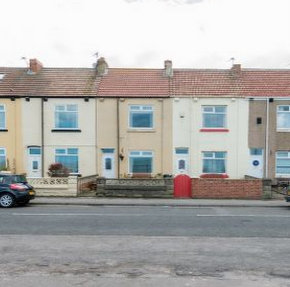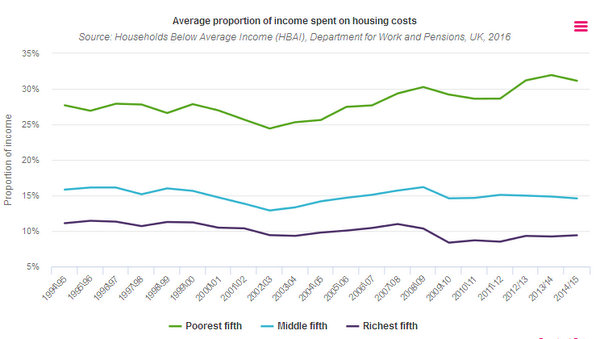
£30 billion to build more homes for rent would help solve record poverty
 Howard Chapman, Buildingtalk Editor, reflects on today’s report from the Joseph Rowntree Foundation about record in-work poverty and a chronic housing crisis, and asks why we can’t build more homes for affordable rent. Is it a practical problem or a political one?
Howard Chapman, Buildingtalk Editor, reflects on today’s report from the Joseph Rowntree Foundation about record in-work poverty and a chronic housing crisis, and asks why we can’t build more homes for affordable rent. Is it a practical problem or a political one?
Record employment with record poverty is not economic growth
There is a reported £30 billion worth of demand in the UK’s build-to-rent sector and 7m people, mainly from working families, in poverty due to high rents. So why can’t we get more homes built for affordable rents? Is it a practical problem or a political one?
If there was truly a desire to create more affordable housing for rent to enable poor working people to escape crippling poverty, then it could be done. It has been before, even in my lifetime, with literally hundreds of thousands of homes built for rent in the 70’s.
Poverty and Social Exclusion report
Today the Joseph Rowntree Foundation (JRF), an independent organisation working to inspire social change, has published their Monitoring Poverty and Social Exclusion 2016 report (MPSE) showing that in-work poverty has hit a record high as the housing crisis fuels insecurity and exorbitant and unsustainable rents. One in every eight workers in the UK – 3.8 million people – are now living in poverty
The number of people living in poverty in the Private Rental Sector (PRS) has doubled in a decade. Almost three quarters of these people pay more than a third of their income in rent.
 The government point to the good news about economic growth and employment that they believe has helped to avoid poverty rates rising even higher. The employment rate is at the highest level ever, at 74.5%, whilst unemployment has fallen to the lowest since 2007. The number of children living in a workless household has continued to fall and is now at the lowest figure on record.
The government point to the good news about economic growth and employment that they believe has helped to avoid poverty rates rising even higher. The employment rate is at the highest level ever, at 74.5%, whilst unemployment has fallen to the lowest since 2007. The number of children living in a workless household has continued to fall and is now at the lowest figure on record.
However, even Mark Carney, the governor of the Bank, recognises that record employment with record poverty is not economic growth and he says Britain is facing “a lost decade” of stagnant incomes where people in work were no better off than before the financial crisis. Today’s JFR report reveals that what is called “in-work poverty” is at record levels, despite these millions of people working hard for not very much pay and turning much of it over to private landlords.
Build homes at fair rents
To reduce poverty, JRF is calling for the Government to cut costs for renters and build more homes by investing £1.1 billion extra a year in affordable housing through a Living Rents scheme. This would deliver 80,0000 genuinely affordable homes each year. We could link social rents to local wages, making them genuinely affordable to people earning the National Living Wage, and cut the Housing Benefit bill in the long term.
£30 billion for purpose-built rental
Another recent report from real estate services firm JLL highlights the requirement and value of the build-to-rent sector in the UK. Experts predict there is pent-up demand worth £30 billion for purpose-built rental accommodation. The chronic shortage of affordable homes for rent must eventually boost development and investment activity. However, government backing for build-to-rent is vital if significant progress is to be made.
New generation of housing entrepreneurs
I believe we also need to encourage a new generation of housing entrepreneurs. In the 19th century we had Edward Guinness (now homes for 120,000 people) and George Peabody (now homes for 70,000 people). Housing is a vital part of the nations’ infrastructure. If Richard Branson can create a railway, maybe he could build homes for the working poor?
The government could help by making land available at a reasonable cost to rather than just making the big house builders or city investors even richer.
Our Prime Minister, Theresa May has spoken of an economy that “works for all”. This means fewer people suffering in-work poverty through paying high rents.
Let’s get on and build more homes – that’s ‘one nation’ politics.
3 comments on “£30 billion to build more homes for rent would help solve record poverty”
Leave a Reply
You must be logged in to post a comment.
Latest news

21st February 2025
ASSA ABLOY EMEIA: Save valuable time and money with a seamless switch to programmable digital keys
In 2025, access management can be a whole lot easier. By making access part of their digital processes, businesses can put time-consuming key management and the cost of changing the locks firmly behind them. Making this switch is a lot easier than many people think, as ASSA ABLOY explains here…
Posted in Access Control & Door Entry Systems, Architectural Ironmongery, Articles, Building Industry News, Building Products & Structures, Building Services, Doors, Facility Management & Building Services, Health & Safety, Information Technology, Innovations & New Products, Retrofit & Renovation, Security and Fire Protection
21st February 2025
Showersave supports industry leaders in addressing Part L and Part G regulations
Showersave has sponsored and participated in a recent Building Insights LIVE roundtable on ‘Water & Energy Saving Innovations in New Build Housing’.
Posted in Articles, Bathrooms & Toilets, Bathrooms, Bedrooms & Washrooms, Building Associations & Institutes, Building Industry Events, Building Industry News, Building Products & Structures, Building Regulations & Accreditations, Building Services, Exhibitions and Conferences, Interiors, Pipes & Fittings, Plumbing, Retrofit & Renovation, Sustainability & Energy Efficiency
21st February 2025
GEZE: The importance of Specifying High Quality Door Closers on Fire Doors
Andy Howland, Sales & Marketing Director at GEZE UK, discusses why specifying high quality door closers on fire doors is important…
Posted in Access Control & Door Entry Systems, Accessibility, Architectural Ironmongery, Articles, Building Industry News, Building Products & Structures, Building Regulations & Accreditations, Building Services, Doors, Facility Management & Building Services, Health & Safety, Posts, Restoration & Refurbishment, Retrofit & Renovation, Security and Fire Protection
21st February 2025
Insight Data achieves ISO9001 recertification with zero non-conformities
Leading industry data specialist, Insight Data, has successfully achieved the prestigious recertification for ISO9001 with zero non-conformities for the fourth consecutive year.
Posted in Articles, Building Industry News, Building Regulations & Accreditations, Building Services, Information Technology, Research & Materials Testing

Earlier this year I visited the Y:Cube affordable housing development pilot project at Mitcham, in the borough of Merton, south London, that demonstrates how homes can be built in the capital for around £50k. This important new ‘not-for-profit’ model for house building in the future can be replicated throughout the UK and offer a significant solution to our growing housing crisis.
Read more via Y:Cube affordable homes to transform UK housing?
A new report by Carter Jonas says the UK is building 15pc fewer homes than it was in the five years before the downturn in 2008 and demonstrate the disjointed residential construction industry. It found that new build homes are valued at an average of 30pc more than second-hand stock, which is the greatest disparity in fourteen years.
Homes for the homeless…
It would be great to see overpaid footballers and other super rich following the example of a wealthy Indian businessman who spent money he had set aside for an extravagant party for his daughter’s wedding on building homes for the poor. The £93k party money went on building 90 homes on two acres of land and he gave them to poor homeless people in his town…. link to story